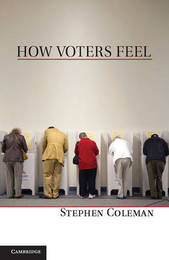
|
How Voters Feel
Hardback
Main Details
| Title |
How Voters Feel
|
| Authors and Contributors |
By (author) Stephen Coleman
|
| Physical Properties |
| Format:Hardback | | Pages:280 | | Dimensions(mm): Height 218,Width 147 |
|
| ISBN/Barcode |
9781107014602
|
| Classifications | Dewey:324.6 |
|---|
| Audience | | Postgraduate, Research & Scholarly | |
|---|
|
Publishing Details |
| Publisher |
Cambridge University Press
|
| Imprint |
Cambridge University Press
|
| Publication Date |
25 February 2013 |
| Publication Country |
United Kingdom
|
Description
This book sets out to unearth the hidden genealogies of democracy, and particularly its most widely recognized, commonly discussed and deeply symbolic act, voting. By exploring the gaps between voting and recognition, being counted and feeling counted, having a vote and having a voice and the languor of count taking and the animation of account giving, there emerges a unique insight into how it feels to be a democratic citizen. Based on a series of interviews with a variety of voters and non-voters, the research attempts to understand what people think they are doing when they vote; how they feel before, during and after the act of voting; how performances of voting are framed by memories, narratives and dreams; and what it means to think of oneself as a person who does (or does not) vote. Rich in theory, this is a contribution to election studies that takes culture seriously.
Author Biography
Stephen Coleman is Professor of Political Communication and Co-Director of the Centre for Digital Citizenship at the Institute of Communications Studies at the University of Leeds. He is also Honorary Professor in Political Science at the University of Copenhagen and Research Associate at the Oxford Internet Institute, University of Oxford. Coleman's most recent publications include Connecting Democracy: Online Consultation and the Flow of Political Communication (with Peter M. Shane, 2011), The Media and the Public: 'Them' and 'Us' in Media Discourse (with Karen Ross, 2009) and The Internet and Democratic Citizenship: Theory, Practice and Policy (with Jay G. Blumler, 2009) - winner of the American Political Science Association award for best book of the year on politics and information technology. He has served as specialist adviser to the House of Commons Information Select Committee inquiry on ICT and public participation in Parliament, as a member of the Puttnam Commission on parliamentary communication with the public and as chair of the Electoral Reform Society's Independent Commission on Alternative Voting Methods.
Reviews'Coleman shows that voting is laden with meaning and emotion, or at least it should be. Building an empirical-cum-theoretical argument for voting as 'social performance', [he] lays down a forceful, deeply innovative challenge to conventional wisdom in contemporary political studies.' Jeffrey C. Alexander, Lillian Chavenson Saden Professor of Sociology, Yale University 'In this eloquent, original, and deeply thoughtful book, Stephen Coleman breaks open the black box of the voting process to uncover a paradoxical aspect of democratic experience that nonetheless remains at the heart of democracy's transformative potential. Drawing on a wide range of literatures and Coleman's own striking empirical data, this is a provocative and important book.' Nick Couldry, Goldsmiths, University of London 'In this groundbreaking analysis of the emotional and affective experiences of voting, Stephen Coleman makes visible a whole dimension of democracy and citizenship that hitherto has been lingering in the shadows. His rich analysis of the complicated tensions between citizens and their elected officials challenges conventional wisdom within both academia and the political realm. Coleman's scholarship is outstanding, his style engaging and accessible.' Peter Dahlgren, Lund University 'Psephology, the study of elections and voters by numbers, is a notoriously bone-dry art. Stephen Coleman shows why. He brings democracy to the study of democracy by spotlighting the vital importance of grasping how and why citizens feel things about voting. Thoughtful, wonderfully imaginative, and positively constructive, this is a beautifully written masterpiece by a foremost world scholar in the flourishing field of political communications.' John Keane, University of Sydney '... if it's elections without stats you're after, this is your book.' Chris Game, Local Government Studies
|